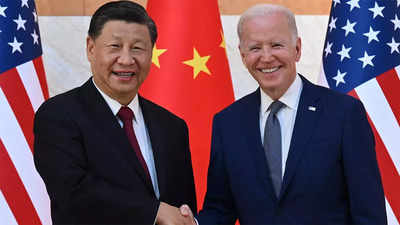
SAN FRANCISCO (Reuters) : U.S. President Joe Biden and Chinese President Xi Jinping will meet on Wednesday before a summit of the Asia Pacific Economic Cooperation (APEC) forum in San Francisco, seeking to reduce friction in what many see as the world’s most dangerous rivalry.
The leaders of the world’s two largest economies have known each other for over a decade and have shared hours of conversation in six interactions since Biden’s January 2021 inauguration. But they have met only once in person since then and Xi has not visited the United States since 2017 when Donald Trump was president.
What issues are they likely to discuss? The White House says the aim of the summit, to be held at an unannounced location in the San Francisco Bay Area, is to boost communication to prevent an intense rivalry from veering into conflict. The meeting is expected to cover global issues from the conflict in the Middle East to Russia’s invasion of Ukraine, North Korea’s ties with Russia, Taiwan, human rights, artificial intelligence, as well as “fair” trade and economic relations.
Biden is expected to tell Xi that the U.S. remains committed to standing with its allies and partners in the Indo-Pacific, in the face of Chinese pressure against democratically governed Taiwan, which China claims as its own, and in the South and East China Seas. He will also express a specific commitment to the security of the Philippines, U.S. officials said.
What deals can we expect?
The White House says Washington is looking for specific outcomes and hopes to see progress in reestablishing military-to military ties with China and in combating the trade in the potent synthetic opioid drug fentanyl, the use of which has become a scourge in the United States. Any deal on fentanyl would likely mean Washington having to lift human rights sanctions on China’s police forensic institute in return.
Biden said on Tuesday his goal would be to resume normal communications with China, including military-to-military contacts. With elections in Taiwan in early 2024, political analysts expect China to seek U.S. assurances that it will do nothing to encourage pro-independence elements, while Xi will also be hoping to persuade Biden to ease up on tariffs and the export controls that aim to keep the most advanced semiconductors from being sent to China. In a separate dinner with business leaders, the Chinese president will also been looking to boost flagging investment by U.S. firms in China.
The leaders may highlight plans to increase commercial flights between the two countries and policy experts said they could move to ease restrictions on journalist visas, which would be to the benefit of both sides. Biden is also expected urge China to use its influence with Iran to not broaden the conflict in the Middle East.
But no one is expecting a reset of the relationship or any grand bargain that will dramatically alter how the countries see each other. “We remain in an enduring period of competition and tension,” said Richard Fontaine of Washington’s Center for a New American Security. “There’s not going to be any big breakthroughs, there won’t be any real change in substance.”
How will the meeting impact markets? Market participants will keep a keen focus on the talks to gauge sentiment between the two governments.
The 21 APEC members and the world beyond hope for an easing of U.S.-China tensions, and progress on that score would be viewed positively, but political analysts said any improvement in the mood could be only temporary. Elections in Taiwan early next year and the November 2024 U.S. presidential vote that could bring a return of Trump, promise a year fraught with uncertainty.






